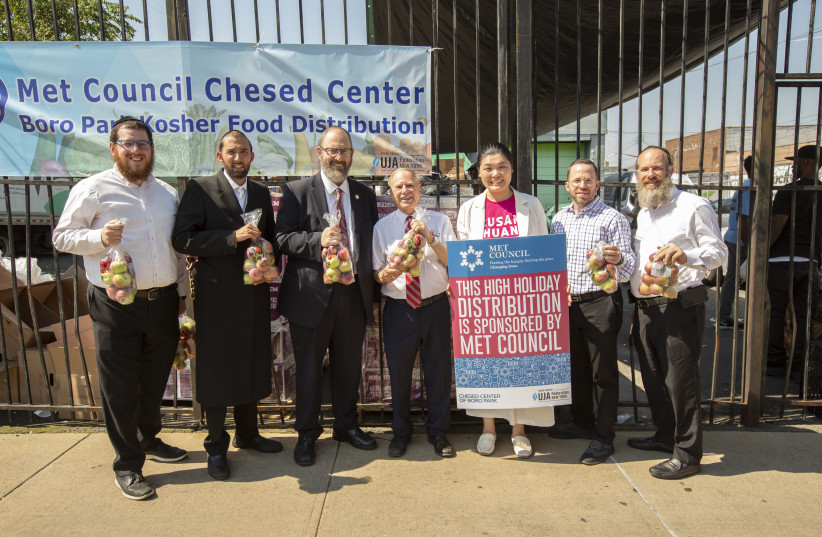As many Americans battle hunger, the Jewish-American NGO the Met Council is expected to serve more than 200,000 food-insecure people in the Tri-State area for the High Holy Days season.
The aid project comes amidst the rising costs of food production and economic inflation, following an emergency aid campaign fundraiser raising $2.3 million to feed the hungry.
Founded in 1972, the Metropolitan Council on Jewish Poverty, known as the Met Council, uses a personalized online ordering system to help donation recipients maximize what they receive while also avoiding waste. Some of the curated items for the holidays include apples and honey, tuna, chicken, gefilte fish, challah, eggs, oil, flour, fresh produce, grape juice, soup mix, rice, canned vegetables and pasta, among other products.
Packaging and distribution were the result of a joint effort of Met Council employees and more than 600 volunteers, including elected government officials.
They are available for pick up for those in need at 141 locations throughout New York, including the five boroughs, Long Island, Westchester, Airmont and Albany. There are also several additional pickup points throughout New Jersey and Connecticut.

“More families are finding themselves grappling with rising food costs as inflation continues to ripple through our economy. Our goal is simple: to ensure that families can celebrate this Yom Tov season with dignity,” Met Council CEO David G. Greenfield said in a statement.
The Met Council was founded in 1972 with a mission to fight poverty and promote the social welfare of those struggling with poverty in New York, including immigrants and the elderly. Their “Kosher Food Network” is the largest kosher food pantry program in the world, reaching more than 305,000 individuals every year.
The organization also has a social services division and provides support to more than 34,000 New Yorkers, aiding with registration for applicable government assistance programs for victims of domestic violence, Holocaust survivors, and other vulnerable groups. Plus, they provide support for the Jewish community's largest network of affordable housing.
Hunger in New York
Approximately one in ten, or about 800,000, New York households experienced food insecurity at some point between 2019-21, according to a report from New York State Comptroller Thomas P. DiNapoli. The report found that food insecurity in the state declined during the COVID-19 pandemic thanks to federal relief programs and the expansion of SNAP benefits, or the Supplemental Nutrition Assistance Program.
“More families are finding themselves grappling with rising food costs as inflation continues to ripple through our economy. Our goal is simple: to ensure that families can celebrate this Yom Tov season with dignity.”
Met Council CEO David G. Greenfield
However, these resources are not infinite and don't apply to all. A separate report from the New York State Comptroller's Office examined trends in poverty. In a statement, DiNapoli said: “Federal aid helped New Yorkers put food on the table during the pandemic, but some relief programs are ending as inflation and other pressures are pushing household budgets to their limit.”
He added: “With all the challenges people are facing during these difficult times, we should ensure New Yorkers don’t go hungry. Our nation’s nutrition programs should be expanded to help those who are struggling to feed themselves and their families.”
